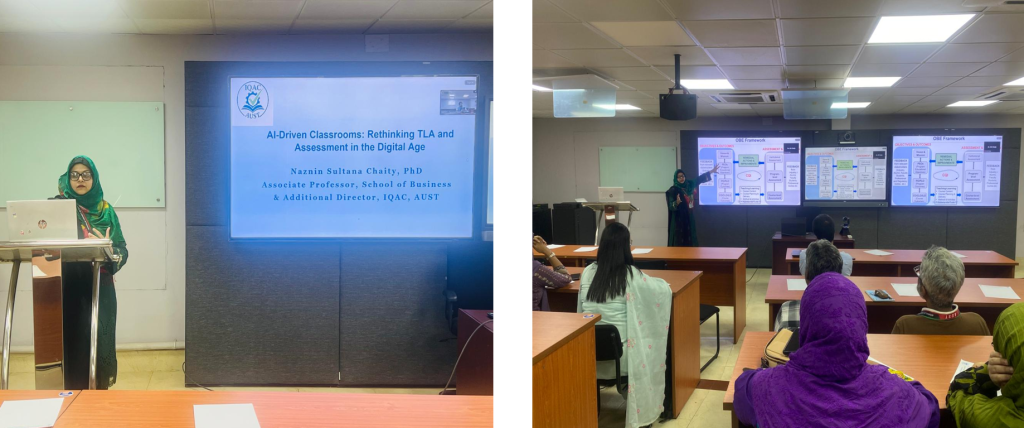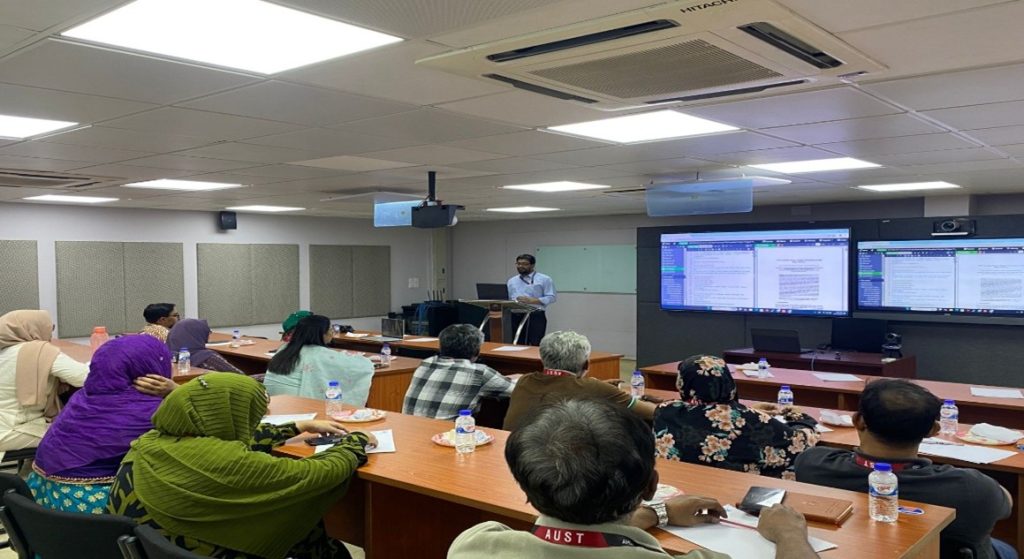Workshop on “AI-Driven Classrooms: Rethinking TLA and Assessment in the Digital Age”
The Institutional Quality Assurance Cell (IQAC) of Ahsanullah University of Science and Technology (AUST) successfully organized a workshop titled “AI-Driven Classrooms: Rethinking TLA and Assessment in the Digital Age”, which was exclusively designed for the faculty members of the School of Business and the Department of Arts and Sciences. The event took place on Wednesday, October 29, 2025, from 2:30 p.m. to 4:00 p.m. at the Distance Learning Theatre, Level-8, Block-C, AUST.

The workshop was conducted under the dynamic leadership of Dr. Naznin Sultana Chaity, Additional Director of IQAC and Associate Professor, School of Business, and Dr. Fakir Sharif Hossain, Additional Director of IQAC and Associate Professor, Department of Electrical and Electronic Engineering, AUST. Both facilitators have been playing a pivotal role in promoting innovative teaching and learning strategies across the university.

The session began with a cordial welcome address delivered by Dr. Naznin Sultana Chaity. In her opening remarks, she warmly greeted the participants and expressed her delight at the presence of enthusiastic faculty members eager to explore the transformative potential of Artificial Intelligence in higher education. She reflected on how the educational landscape is rapidly evolving with the integration of AI tools and how such technologies are redefining the traditional concepts of teaching, learning, and assessment.
Dr. Chaity elaborated on the importance of embracing AI not merely as a technological advancement but as a pedagogical innovation capable of fostering deeper learning and critical thinking among students. She also emphasized the need for faculty to remain adaptive and forward-thinking in adopting AI-driven strategies to ensure that classroom practices align with the global shift toward digital and data-based education. Furthermore, she provided several practical examples of how AI tools can be seamlessly integrated into classroom activities, such as automating assessments, designing personalized learning experiences, and enhancing student engagement through intelligent content delivery systems.

Following her insightful introduction, Dr. Fakir Sharif Hossain took the floor to deliver an engaging and comprehensive presentation on a variety of AI-based tools that can enhance both teaching and academic research. He demonstrated the use of ChatGPT, LaTeX, Overleaf, and several other AI-supported platforms that assist educators in content creation, academic writing, and classroom interaction. Dr. Hossain also discussed the potential ethical and professional considerations that accompany the use of AI in academic environments, encouraging participants to balance innovation with integrity.

Throughout his session, Dr. Hossain emphasized how tools like ChatGPT could act as collaborative aids for educators, helping them design interactive assignments, generate resource materials, and streamline administrative tasks. He further illustrated how LaTeX and Overleaf could significantly improve academic document preparation, research collaboration, and publication quality. His presentation was both practical and inspiring, motivating the faculty to explore these resources in their respective disciplines.
The workshop concluded with a vote of thanks offered by Dr. Fakir Sharif Hossain, who expressed his sincere appreciation to all participants for their active involvement and thoughtful contributions during the discussion. He commended the faculty for their openness to innovation and urged them to apply the knowledge gained in their teaching and assessment practices.